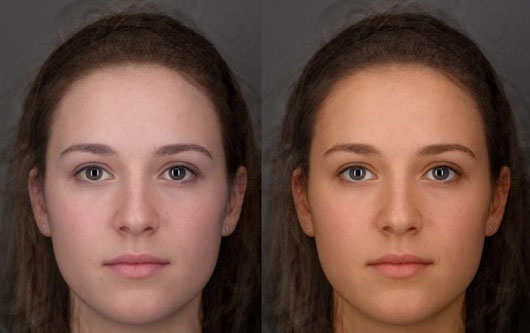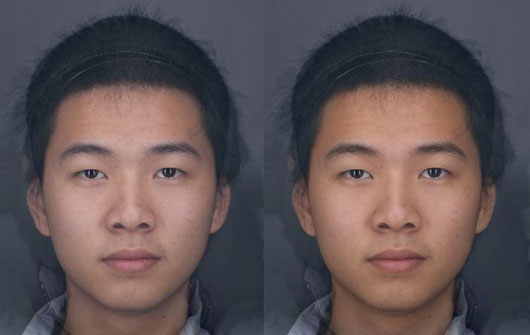You look good enough to eat


Images show improved skin colour on the right in both Caucasian and Asian faces, following an increase in fruit and veg for a 6 week period.
Eating more fruit and veg can make your skin glow within a matter of weeks, according to new research.
The new study, by scientists at the University of St Andrews, proves that eating ‘five a day’ really is good for you.
The researchers hope that their findings, which don’t preach about long term health benefits, will appeal to the nation’s vanity instead.
The research, published today (Wednesday 7 March 2012), examined the impact of carotenoid pigments – orangey-red pigments found in fruit and vegetables – on skin colour.
The results showed that just two extra portions of fruit and vegetables per day created a detectable change in skin colour within six weeks.
St Andrews’ researcher Ross Whitehead said, “Most of us know we should eat plenty of fruit and veg, yet we are not sufficiently motivated to actually go ahead and eat a healthy diet.
“Government strategies aimed at improving diet typically only offer information about why a healthy diet is good for us. These strategies have, so far, had no real impact on the nation’s eating habits.
“We hope that by highlighting the rapidly achievable benefits of a healthy diet on our attractiveness will be a stronger incentive for people to eat more healthily. Knowing you are going to look more attractive in a few weeks may be more persuasive than the promise of health benefits later in life.”
Poor diet represents a major source of preventable illness and death worldwide. The researchers say that 75% of people in the UK currently do not eat the NHS recommended “5-a-day”, a shocking finding considering the UK recommendations are much lower than those in other countries (American guidelines suggest up to 13 portions of fruit and vegetables per day for an active male).
The St Andrews scientists tracked 35 students over a 6 week period, measuring natural changes in their diet and skin colour. At the same time, the researchers measured how big a change in skin colour needs to occur before it is noticed by others.
Those individuals that improved their diet over the study period showed an increase in the desired golden skin tone, while the colour reduced in those whose diet had slipped.
Ross Whitehead continued, “People who eat more fruit and vegetables have a ‘golden’ skin tone that looks healthy and attractive. Our latest research finds that even small improvements in diet produces visible benefits to skin colour. We were very surprised by how quick the changes were.”
The researchers say that larger or more prolonged dietary changes are likely to make the skin look increasingly healthy over time.
The study is a collaboration between psychologists in the Perception Lab and the School of Medicine.
Dr Gozde Ozakinci, a Lecturer in Health Psychology at St Andrews, commented, “Appearance can be a powerful motivator. It is being used in other health campaigns to persuade people to avoid smoking, excessive sun exposure and alcohol consumption, all of which may speed up ageing. Our research points to the different benefits of a diet rich in fruit and vegetables on a healthy skin appearance.”
The team is currently conducting trials in Scotland to determine whether people are persuaded to change their dietary habits when they see the possible benefits.
Professor David Perrett, who supervised the study, concluded, “Although skin colour varies markedly across the world, we find similar effects across different cultures – for Asians and Europeans alike a good diet is associated with an attractive skin tone. The message that a good diet improves skin colour could improve health across the globe.”
ENDS
Note to Editors
The work was funded by the Economic and Social Research Council (ESRC) and Unilever Research & Development USA. Professor Perrett leads the research under a British Academy Wolfson Research Professorship.
The paper ‘Appealing to Vanity: Could Potential Appearance Improvement Motivate Fruit and Vegetable Consumption?’ is published in the American Journal of Public Health. Ref (2012) 102(2), 207-211.
For further information and to participate in the research visit: www.perceptionlab.com
The researchers are available for interview:
- Ross Whitehead – email [email protected] or call 01334 463 044
- David Perrett – email [email protected] or call 01334 463 044
- Gozde Ozakinci – email [email protected] or call 01334 463521
Note to Picture Editors
Images that show the changed facial appearance are available from the Press Office – contacts below.
Issued by the Press Office, University of St Andrews
Contact Gayle Cook, Senior Communications Manager, on 01334 467227, email [email protected]
Ref: Good enough to eat 070312
Follow St Andrews news on Twitter http://twitter.com/univofstandrews/
Category Public interest stories